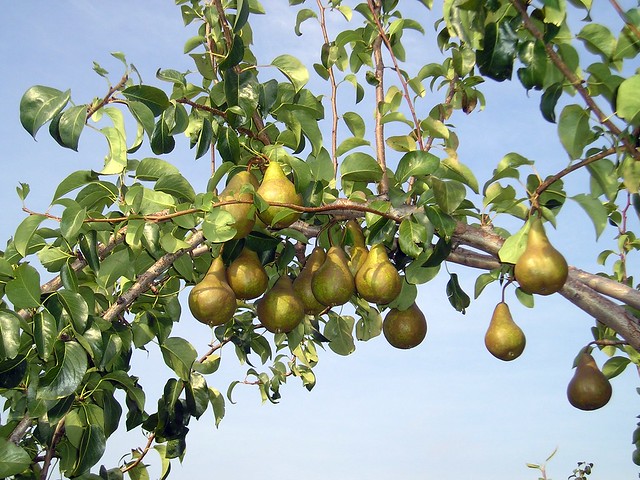
Walking in Grandfather's old, untended orchard,
We find the trees grown taller than our reach,
The aged trunks too thick to shake,
Stubborn as Grandfather himself,
Thinking we women have no need for pears.
You climb and shout as wild as a boy,
"I'll toss them down, you catch;
Pretend each one's a china egg."
A furtive skill we practice then,
Filling our aprons when baskets fail,
Treading softly on the attic stair;
No need to tell our Jack and Will,
Whose bed and board we richly serve,
How pears lie wrapped in hidden rooms,
In secret watched and gently turned.
Long past their natural life
Our summer hoard grows slowly ripe
As daughter turns to mother blessed
And smiles across the cloth are passed
While, lips upon the mellow skin,
We catch each other's glowing eyes
Setting our teeth against the fruit.
But Jack and Will cry out for knives,
Pearl handles glow, stilettos flash,
Quick work is made of stem and core,
Only a crescent remains, a wasted moon.
A fall of snow shakes down the leafless trees
Like Leghorn feathers whitening nests
Of brooding hens: our orchard stirs
And waits for Nature's fresh assault.
[Undated poem by Virginia McKinnon Mann. Photo by Chris Walsh.]

This poem makes me think of "The Pear" by Ruth Stone.
ReplyDeletehttp://www.poetryfoundation.org/poetrymagazine/poem/244126
It's interesting that there are many names for people based on trees, for example: Aspen, Daphne, Hazel, Holly, Keisha, Lindsay, Livia, Matsuko, Olivia, Perry, Sequoia, and Willow for example. The name Perry is refers to the pear tree.
I've often wondered about these associations between people and elements of the wider natural world. This poem on Ripening Pears makes the connection very intimate, and Ruth Stone's poem also has this quality.